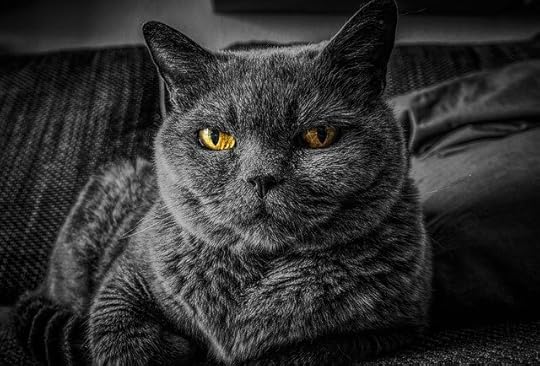Writing Tip 437: “Gray” vs. “Grey”
 What color is this cat? No, he’s not judging you as you decide… why would you say that?
What color is this cat? No, he’s not judging you as you decide… why would you say that?Whether you want to blame Ben Franklin or Noah Webster, sometimes, the English language seems unnecessarily complicated, doesn’t it?
The spelling of “gray” vs. “grey” is another such case.
But, wait, there is an answer to your question. You just need to specify which gray/grey you’re looking for.
Fancy mustard? Grey PouponBreakfast tea? Earl GreyRacing dog and/or busline? GreyhoundOscar Wilde novel? The Picture of Dorian GrayOld horse who ain’t what she used to be? The Old Gray MareTissue in the brain and spinal cord and/or an abstract term for intelligence? Gray matter, more commonly, but both are used.The purchasing power of older generations? The gray dollar or the grey poundColor? Let me answer that question with another that you might have seen coming: where do you live?In American English, the color is spelled “gray.” In British English, which is used across much of the world, the color is spelled “grey.” Both are correct. It’s just a matter of audience expectations and perhaps the writer’s background.
Let Earl Grey tea (clearly British) and the Old Gray Mare (of the American folksong canon) be your touch points here. If ever there was a contrast showcasing particularities of both sides of the pond, this might be it.
“Earl” begins with “e,” thus Earl Grey helps remind you of the British spelling.“Mare” has a long “a” just like “gray”; thus, that old horse speaks for the States.First names, surnames, and ways to describe a cloudy day aside, sometimes the choice of “gray” vs. “grey” seems complicated. The English language can make all of us pause sometimes, but as we continue pursuing our best, we just have to keep at it. Perseverance can lead to great things—there’s no gray/grey area in that debate, folks.
Sign-up for my monthly language tips and trivia email newsletter for more articles like this.
The post Writing Tip 437: “Gray” vs. “Grey” appeared first on Kris Spisak.



